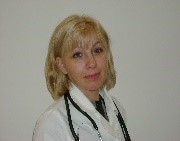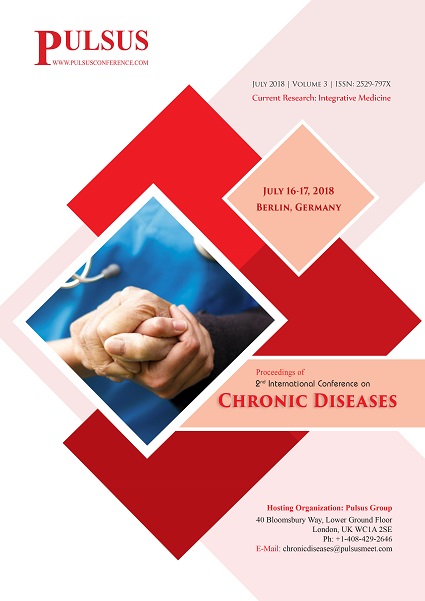Renowned Speakers
We’ve invited the top most influential speakers from around the world to give inspirational talks and lead practical workshops.
Conference Information
About Conference
On behalf of the organizing committee we invite you to attend 4th International Conference on Chronic Diseases (Chronic Diseases 2020) scheduled to be held in Paris, France during February 17-18, 2020.
Chronic Diseases 2020 is a global event focusing on the immense knowledge and major advances in the rapidly emerging fields of chronic diseases by attracting experts and professionals across the universe.
It is the one among the best platform to have the discussion innovative researches and developments in the field of cluster of chronic diseases and so on.
Importance and Scope:
4th International Conference on Chronic Diseases is intended to urge more noteworthy collaboration to offer a forum that will connect people worldwide for the exchange of ideas under the theme “Health Promotion and Diseases Prevention”
Why to attend?
With the huge number of participants across the globe, Chronic Diseases 2020 focussed on learning about cutting edges in the field of long-lasting diseases and others. This 2-day program will offer the best opportunity to conduct workshop, symposium, oral talks and others.
Who attends?
Chronic Diseases 2020 invites experts in the field of chronic diseases which includes cardiology, nephrology, neurology, osteology, hepatology, oncology, endocrinology, pulmonology, immunology, bariatrics, pharmacology, biotechnology and the related doctors, researchers, physicians, business professionals, infection and quality control clinicians, exercise physicians, yoga practitioners, students, scientists, medical and pharma companies, medical colleges and hospitals and delegates from industries as well as biomedical research.
Related :
Chronic Diseases Conferences | Chronic Diseases Meetings | Chronic Diseases Events | Chronic Diseases 2020 | Healthcare Conferences | Chronic Diseases Workshop.
Call For Submissions :
We are current accepting abstracts from the relevant researchers/experienced professionals to share their knowledge in this fields. For any clarification regarding the program contact the program manager by emailing at : chronicdiseases@pulsusmeet.com
Scientific Sessions
Track 1: Chronic Diseases
Chronic Diseases are usually the long-term medical conditions and are progressive. Chronic diseases include Heart Disease, Diabetes, Stroke, Asthma, Cancer, Chronic Respiratory Diseases, Chronic Obstructive Pulmonary Disease, Diabetes Mellitus, Hypertension, Lipid Disorders. At present, these are about enormous causes of disability and death, representing 60% of all deaths. The fact is that chronic diseases generally cannot be prevented by vaccines or cured by medication, nor do they just go off. Health damaging behaviours - such as tobacco use, lack of physical activity, and poor eating habits - are major reasons to the emerging chronic diseases. Chronic diseases usually become prevalent with ages. Adopting higher lifestyle practices such as a healthy and nutritious diet, regular exercise, and avoiding tobacco will stop the onset of extensive complications of chronic diseases.
Radiology Software | PACS Software | AI Radiology
Related Societies:
The National Association of Chronic Disease Directors, American Public Health Association, The American College of Radiation Oncology, The Global Health Workforce Alliance, Australian Disease Management Association, European chronic diseases alliance, Australian institute of health and welfare, Chronic Disease Research Foundation, Australian Chronic Disease Prevention Alliance, Indian Society of Nephrology, American Thoracic Society Forum of International Respiratory Societies, Asian Pacific Society of Cardiology, American Board of Psychiatry and Neurology, American Neurological Association, American Society of Echocardiography, American Association of Heart Failure Nurses
Track 2: Chronic Respiratory Diseases
Endless respiratory diseases refer to infections of the aviation routes and different parts of the lung. Probably the most generally recognized are asthma, chronic obstructive pneumonic illness (COPD), lung malignancy, cystic fibrosis, sleep apnea and word related lung infections. Respiratory diseases attacks everyone including all ages-kids, high schoolers, grown-ups and seniors. The greater part of these respiratory ailments is perpetual in nature and all have a commendable effect on the person with the sickness. CRDs are not repairable, however, treatment may reduce shortness of breath and control side effects and increase the personal satisfaction for individuals with this ailments.
Conference on Respiratory Diseases | Respiratory Diseases Summit
Related Societies:
American Society of Nuclear Cardiology, American Society of Hypertension, Romanian Society of Cardiology, World Federation of Neurology, European Paediatric Neurology Society, British Hypertension Society, The Obesity Society, The Cancer Society of Finland, Australian Cervical Cancer Foundation, Australian Institute of Health and Welfare, Canadian Association of Pharmacy in Oncology, Prostate Cancer Foundation of Australia
Track 3: Chronic Osteoarticular Diseases
Osteoarticular disorder or rheumatic disease is a cluster of conditions like arthrosis, joint inflammation, and related musculoskeletal issue. The most well-known of its rheumatic illnesses Arthrosis is a perpetual joint issue. It promotes degeneration of the ligament encompassing. As it extends, the sickness tends to include the adjoining bone tissue, the articular container, the muscles, the ligaments and the tendons, considering the further degeneration of the joint ligament because of rehashed aggravation. The beginning of most osteoarticular issue is challenging in nature. Treatment of dynamic irritations depends on the usage of medicines that contradict this procedure while controlling the manifestations.
Orthopedic Conference | Arthroplasty Conference
Related Societies:
The Chronic Disease Prevention Alliance of Canada, National Association of Chronic Disease Directors, European Society for Medical Oncology, European Heart Network, European kidney health alliance, International Diabetes Federation, European COPD Coalition, European Cancer Organisation, European Respiratory Society, European Society of Cardiology, European Society of Hypertension, European Association for the Study of the Liver, European Academy of Allergy and Clinical Immunology, The American Heart Association, Society for Neuroscience
Track 4: Neurodegenerative Diseases
Neurodegenerative disease is a term that primarily focuses on the neurons in the human brain. Neurons are the primary source of the nervous system which includes the brain and spinal cord. Neurons normally don’t regenerate themselves, so when they become damaged, they cannot be replaced by the body. Neurodegenerative diseases are incurable and attenuate conditions that result in stepwise degeneration and / or death of nerve cells. This causes problems with movement or mental functioning.
Related Societies:
The National Association of Chronic Disease Directors, American Public Health Association, The American College of Radiation Oncology, The Global Health Workforce Alliance, Australian Disease Management Association, European chronic diseases alliance, Australian institute of health and welfare, Chronic Disease Research Foundation, Australian Chronic Disease Prevention Alliance, Indian Society of Nephrology, American Thoracic Society Forum of International Respiratory Societies, Asian Pacific Society of Cardiology, American Board of Psychiatry and Neurology, American Neurological Association, American Society of Echocardiography, American Association of Heart Failure Nurses
Track 5: Cardiovascular Diseases
Cardiovascular disease refers to the condition or symptoms that affect the structures or function of your heart, such as Coronary artery disease meaning narrowing of the arteries, Heart attack, Abnormal heart rhythms, or arrhythmias, Heart failure, Heart valve disease, Congenital heart disease, Heart muscle disease (cardiomyopathy), Pericardial disease, Aorta disease and Marfan syndrome, Vascular disease. Cardiovascular illnesses are extremely main source of death. As there are many cardiovascular diseases in most of the cases, they may be treated by using minimally invasive heart surgery or percutaneous coronary interventions.
Related Societies:
American Society of Nuclear Cardiology, American Society of Hypertension, Romanian Society of Cardiology, World Federation of Neurology, European Paediatric Neurology Society, British Hypertension Society, The Obesity Society, The Cancer Society of Finland, Australian Cervical Cancer Foundation, Australian Institute of Health and Welfare, Canadian Association of Pharmacy in Oncology, Prostate Cancer Foundation of Australia
Track 6: Obesity and Chronic Diseases
Overweight and obesity are defined as abnormal or excessive fat accumulated that may cause hinderance to your health. It may lead to the conditions such as High blood pressure, Heart disease and stroke, diabetes, cholesterol level increase, Joint problems caused by extra weight, Trouble breathing, and Gallstones. In a word obesity can be described as the global epidemic and the obesity and nutrition related chronic diseases are common everywhere.
Related Societies:
The Chronic Disease Prevention Alliance of Canada, National Association of Chronic Disease Directors, European Society for Medical Oncology, European Heart Network, European kidney health alliance, International Diabetes Federation, European COPD Coalition, European Cancer Organisation, European Respiratory Society, European Society of Cardiology, European Society of Hypertension, European Association for the Study of the Liver, European Academy of Allergy and Clinical Immunology, The American Heart Association, Society for Neuroscience
Track 7: Diabetology & Metabolic Diseases
Diabetes is a condition that occurs when your blood glucose is too high. Insulin, a hormone produced by the pancreas, helps glucose from food get into your cells to be used for energy. Sometimes your body doesn’t make enough usage of insulin. Glucose then stays in your blood and does not find the way to reach our cells. In such a cases having too much glucose in your blood can cause health problems. Though there is no cure one can take effective steps to maintain the glucose level and stay healthy. Type 1-your body does not make insulin. Your immune system attacks and destroys the cells in your pancreas that make insulin. Type 2- your body does not use insulin well. It is the most common type of diabetes. Gestational diabetes is common in pregnant women. It is usually temporary and goes-off after pregnancy.
Related Societies:
The National Association of Chronic Disease Directors, American Public Health Association, The American College of Radiation Oncology, The Global Health Workforce Alliance, Australian Disease Management Association, European chronic diseases alliance, Australian institute of health and welfare, Chronic Disease Research Foundation, Australian Chronic Disease Prevention Alliance, Indian Society of Nephrology, American Thoracic Society Forum of International Respiratory Societies, Asian Pacific Society of Cardiology, American Board of Psychiatry and Neurology, American Neurological Association, American Society of Echocardiography, American Association of Heart Failure Nurses
Track 8: Cancer
Cancer also called as malignancy is the abnormal growth of the cell in the body spread to the all over body parts. Main signs for the cancer include unexplained weight loss, abnormal bleeding, lump, and change in bowel movements. There are more than 100 cancers that causes damages to the human health. Many cancers can be prevented by avoiding alcohol, consumption of tobacco. Cancer can be treated by using chemotherapy, surgery, radiation therapy and targeted therapy.
Related Societies:
American Society of Nuclear Cardiology, American Society of Hypertension, Romanian Society of Cardiology, World Federation of Neurology, European Paediatric Neurology Society, British Hypertension Society, The Obesity Society, The Cancer Society of Finland, Australian Cervical Cancer Foundation, Australian Institute of Health and Welfare, Canadian Association of Pharmacy in Oncology, Prostate Cancer Foundation of Australia
Track 9: Hypertension
Hypertension in other words can be explained as high blood pressure. Scientifically blood pressure is the force of your blood pushing against the walls of your arteries. Hypertension are the main causes of abnormal blood pressure. High blood pressure usually does not have any symptoms. Hypertension may lead to the risk such as heart failure, chronic kidney disease, stroke, and coronary artery disease and vision loss. Lifestyle factors that cause the hypertension includes excess body weight, excess salt and alcohol.
Related Societies:
The Chronic Disease Prevention Alliance of Canada, National Association of Chronic Disease Directors, European Society for Medical Oncology, European Heart Network, European kidney health alliance, International Diabetes Federation, European COPD Coalition, European Cancer Organisation, European Respiratory Society, European Society of Cardiology, European Society of Hypertension, European Association for the Study of the Liver, European Academy of Allergy and Clinical Immunology, The American Heart Association, Society for Neuroscience
Track 10: Kidney Diseases
Nephropathy means kidney disease or damage. Kidneys important function is to filter waste products from the blood. They are primarily involved in regulating high blood pressure, electrolyte balance, and red blood cell production in the body. Symptoms of kidney failure includes irregular heartbeat, seizure or comma, fluid retention and fatigue . Inability to remove potassium from the bloodstream may lead to abnormal heart rhythms and sudden death. Initially kidney failure may cause no symptoms. High blood pressure, high cholesterol, diabetic nephropathy, IgA nephropathy are the complications of kidney.
Related Societies:
The National Association of Chronic Disease Directors, American Public Health Association, The American College of Radiation Oncology, The Global Health Workforce Alliance, Australian Disease Management Association, European chronic diseases alliance, Australian institute of health and welfare, Chronic Disease Research Foundation, Australian Chronic Disease Prevention Alliance, Indian Society of Nephrology, American Thoracic Society Forum of International Respiratory Societies, Asian Pacific Society of Cardiology, American Board of Psychiatry and Neurology, American Neurological Association, American Society of Echocardiography, American Association of Heart Failure Nurses
Track 11: Thyroid Diseases
Thyroid disease is referred to be the condition that affects the thyroid gland. Thyroid diseases are four types, hypothyroidism; hyperthyroidism; structural abnormalities, most commonly an enlargement of the thyroid gland; and tumours which can be benign or malignant cancer. Main symptoms of thyroid disease include muscle cramps, weight gain, slow movement and tiredness. Thyroid diseases can be diagnosed by using the methods such as biopsy, ultrasound and radioiodine scanning.
Related Societies:
American Society of Nuclear Cardiology, American Society of Hypertension, Romanian Society of Cardiology, World Federation of Neurology, European Paediatric Neurology Society, British Hypertension Society, The Obesity Society, The Cancer Society of Finland, Australian Cervical Cancer Foundation, Australian Institute of Health and Welfare, Canadian Association of Pharmacy in Oncology, Prostate Cancer Foundation of Australia
Track 12: Liver Diseases
As most of us know cirrhosis is one of the most common liver condition in this type of diseases the healthy liver tissue is replaced by the body tissue leading to improper function of the liver. The liver has many important functions like removal of waste, production of bile to digest the food, and making many new proteins. Autoimmune disorders, parasitic infections and use of certain medicines may also be the reason for certain types of chronic liver diseases.
Related Societies:
The Chronic Disease Prevention Alliance of Canada, National Association of Chronic Disease Directors, European Society for Medical Oncology, European Heart Network, European kidney health alliance, International Diabetes Federation, European COPD Coalition, European Cancer Organisation, European Respiratory Society, European Society of Cardiology, European Society of Hypertension, European Association for the Study of the Liver, European Academy of Allergy and Clinical Immunology, The American Heart Association, Society for Neuroscience
Track 13: Autoimmune Diseases
Autoimmune disorder arises when the body acts against its own antibodies. There are upwards of 80 types of immune system infections. A heavy portion of them has comparable manifestations, which makes them extremely difficult to analyse. Immune system illnesses typically vary between times of reduction and flare-ups. Currently, treatment for immune system diseases focuses on reducing the effects of reducing the effects of the diseases as there is no potential cure for it currently.
Related Societies:
The National Association of Chronic Disease Directors, American Public Health Association, The American College of Radiation Oncology, The Global Health Workforce Alliance, Australian Disease Management Association, European chronic diseases alliance, Australian institute of health and welfare, Chronic Disease Research Foundation, Australian Chronic Disease Prevention Alliance, Indian Society of Nephrology, American Thoracic Society Forum of International Respiratory Societies, Asian Pacific Society of Cardiology, American Board of Psychiatry and Neurology, American Neurological Association, American Society of Echocardiography, American Association of Heart Failure Nurses
Track 14: HIV/AIDS
HIV is a virus that attacks immune cells called CD-4 T cells. AIDS (acquired immunodeficiency syndrome) is caused by a virus called HIV (human immunodeficiency virus). This diseases are estimated to weaken the human immune system and makes the body prone to many types of viral diseases. This susceptibility worsens if the syndrome progresses. HIV can spread to all the tissues of the body but is transmitted through the body fluids of an infected person (semen, vaginal fluids, blood, and breast milk).
Related Societies:
American Society of Nuclear Cardiology, American Society of Hypertension, Romanian Society of Cardiology, World Federation of Neurology, European Paediatric Neurology Society, British Hypertension Society, The Obesity Society, The Cancer Society of Finland, Australian Cervical Cancer Foundation, Australian Institute of Health and Welfare, Canadian Association of Pharmacy in Oncology, Prostate Cancer Foundation of Australia
Track 15: Depression & Mental Illness
Depression is a common mental disorder that causes people to experience the symptoms such as depressed mood, either weight gain or loss, low concentration, Apathy and sleeping problems. In some cases, depression increases the burden of diseases in patients suffering from chronic medical conditions. Mental health is important at every stage of life. For huge number of people chronic illness and depression has become the one among the important Factors in life.
Related Societies:
The Chronic Disease Prevention Alliance of Canada, National Association of Chronic Disease Directors, European Society for Medical Oncology, European Heart Network, European kidney health alliance, International Diabetes Federation, European COPD Coalition, European Cancer Organisation, European Respiratory Society, European Society of Cardiology, European Society of Hypertension, European Association for the Study of the Liver, European Academy of Allergy and Clinical Immunology, The American Heart Association, Society for Neuroscience
Track 16: Stroke
A stroke occurs when the blood supply to the part of the brain is generally cut-off, make the brain tissue to strive for nutrients and oxygen, so soon after that the brain cells begin to die. A stroke can be generally caused due to three main factors blocking of the artery, leakage or bursting of the artery and many other cases. For some people the problem is only temporary and can be rectified they do not cause any permanent damage. One interesting fact to hear is that stroke is only the medical emergency and can be treated and prevented.
Related Societies:
The National Association of Chronic Disease Directors, American Public Health Association, The American College of Radiation Oncology, The Global Health Workforce Alliance, Australian Disease Management Association, European chronic diseases alliance, Australian institute of health and welfare, Chronic Disease Research Foundation, Australian Chronic Disease Prevention Alliance, Indian Society of Nephrology, American Thoracic Society Forum of International Respiratory Societies, Asian Pacific Society of Cardiology, American Board of Psychiatry and Neurology, American Neurological Association, American Society of Echocardiography, American Association of Heart Failure Nurses
Track 17: Chronic Fatigue Syndrome
Chronic Fatigue Syndrome as per the name it is one of the most complex diseases and it is difficult to explain by means of any complex medical condition. On continues physical or mental activity the diseases may get worsen but it does not improve on rest. It can also be referred as systemic exertion intolerance disease (SEID) or myalgic encephalomyelitis (ME). The major responsible causes for the chronic diseases are unknown but there are many proposals ranging from infection to psychological stress. There is no potential cure for the chronic fatigue syndrome. Treatment of chronic diseases focuses on lowering its symptoms.
Related Societies:
American Society of Nuclear Cardiology, American Society of Hypertension, Romanian Society of Cardiology, World Federation of Neurology, European Paediatric Neurology Society, British Hypertension Society, The Obesity Society, The Cancer Society of Finland, Australian Cervical Cancer Foundation, Australian Institute of Health and Welfare, Canadian Association of Pharmacy in Oncology, Prostate Cancer Foundation of Australia
Track 18: Diagnosis and Therapies
Usually medical diagnosis or therapies will help us in the process of detecting the diseases or conditions by explaining the victim’s symptoms and signs. The way we diagnose the diseases with symptoms and signs are highly non-specific. Usually the diagnosis and therapies provide the better way for patient care, contribute to consumer health and reduces the healthcare spending at the final stages.
Related Societies:
The Chronic Disease Prevention Alliance of Canada, National Association of Chronic Disease Directors, European Society for Medical Oncology, European Heart Network, European kidney health alliance, International Diabetes Federation, European COPD Coalition, European Cancer Organisation, European Respiratory Society, European Society of Cardiology, European Society of Hypertension, European Association for the Study of the Liver, European Academy of Allergy and Clinical Immunology, The American Heart Association, Society for Neuroscience
Track 19: Risk Factors
Chronic Diseases are responsible for the large portion of burden of diseases in many of the countries across the globe. The major causes of chronic diseases or the important features of chronic diseases includes physical inactivity, unhealthy diet, tobacco use, and in rare cases heredity and mutation. Chronic diseases are the life lasting problem both the emotional and medical support are essential to overcome the diseases.
Related Societies:
The National Association of Chronic Disease Directors, American Public Health Association, The American College of Radiation Oncology, The Global Health Workforce Alliance, Australian Disease Management Association, European chronic diseases alliance, Australian institute of health and welfare, Chronic Disease Research Foundation, Australian Chronic Disease Prevention Alliance, Indian Society of Nephrology, American Thoracic Society Forum of International Respiratory Societies, Asian Pacific Society of Cardiology, American Board of Psychiatry and Neurology, American Neurological Association, American Society of Echocardiography, American Association of Heart Failure Nurses
Track 20: Epidemiology
Epidemiology is the study of disease transmission by analysing the causes, effects and symptoms in the specific population. At the later stages it acts as the guide in the management of the population in which the diseases had already developed. Generally, the epidemiological information is used to pre-design and evaluate the strategies to prevent illness and to control health problems.
Related Societies:
American Society of Nuclear Cardiology, American Society of Hypertension, Romanian Society of Cardiology, World Federation of Neurology, European Paediatric Neurology Society, British Hypertension Society, The Obesity Society, The Cancer Society of Finland, Australian Cervical Cancer Foundation, Australian Institute of Health and Welfare, Canadian Association of Pharmacy in Oncology, Prostate Cancer Foundation of Australia
Market Analysis
Chronic Diseases grows as a long lasting and often incurable diseases. This creates the increasing thirst in the market to enquire about them. This 4th International Conference on Chronic Diseases will offer an extradinary platform to discuss about it. By utilizing this opportunity, the Chronic Diseases 2020 will offer a better comprehension of predicting, analysing and delivering the potential cure for Chronic Diseases.
Why Paris, France?
Paris the capital of France will be a best centre for art, fashion, gastronomy and culture. Paris well known for its museums and architectural landmarks will be an excellent fit for the tourists. Being a third largest country of Europe, it became excellent fit for the 4th International Conference on Chronic Diseases.
Market Analysis
The global Health market was about $10.5 billion in 2014, estimated to register a high CAGR of 33.5% during till 2020.
Global Anti-diabetics Market size is projected to reach USD 116.1 billion by 2023; as per the latest research report by Global Market Insights, Inc. As pre the estimation there will be 10.9% CAGR increase in Global insulin antidiabetics market size which was evaluated to be USD 51.1 billion in 2015.
Global anti-obesity therapeutics market is estimated to hike at a CAGR of above 20.0%. The global obesity surgery device market is estimated at USD 1,432.4 million in 2014. It is likely to grow at a CAGR of 9.6% from 2014 to 2020 to reach USD 2,489.5 million in 2020.
The global chronic obstructive pulmonary disease (COPD) drugs market is estimated to grow at a CAGR of 4.85% during the period 2016-2020.
Europe Autoimmune disease therapeutics market is projected to create up to USD 4.58 billion at a CAGR of 1.6% by 2020 control and prevent diseases. However, the global autoimmune diseases treatment market is estimated to reach $15.97 billion by 2022 at CAGR of 3.80%
Cardiovascular Diseases Therapeutics is estimated to increase at a CAGR of 4.1% globally. The top eight markets to grow are of Germany, France, Italy, Spain, Japan, UK and USA.
With the help of the all above given statistics we can make sure that chronic diseases are one among the major threat for which the continues effort must be taken to discuss about it.
Past Conference Report
With a great support from our Collaborators and Organizing Committee, PULSUS Conferences successfully completed its one of the conferences in the area of diseases “3rd International Conference on Chronic Diseases” (Chronic Diseases 2019) which was held at London, UK on May 20-21, 2019.
We would like to thank our Organizing Committee Members comprising-
Dipak Ramji - Cardiff University, UK
Francesco Lippi- University of Pisa, Italy
Shen Yuan Yuan - Capital Medical University, China
Mingxia Yuan - Capital Medical University, China
We would like to extend our thanks to our collaborators for their constant support. It wouldn’t have been possible without the support of our Media Partners who helped us in promoting this event. We thank our Media partners for their support in helping us reach greater audience.
We also would like to thank all our Speakers, Poster Presenters and Delegates for taking out your time and sharing their research work with our peer network. We are very glad to have shared a great relationship with all these Attendees, associations and we hope to see even greater support in our upcoming events.
With a great response and feedback which we received at this event Pulsus Conferences is proud to announce our upcoming conferences in the area of Infection.
Let’s meet again @ Chronic Diseases 2020













